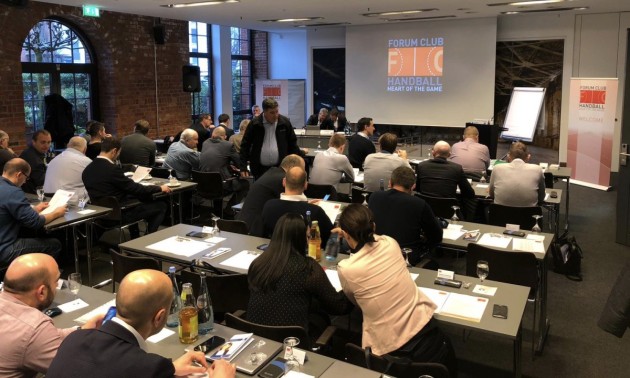
20th Forum Club Handball General Assembly
Miljković was present alongside the other Forum Club Handball (FCH) club representatives for both semi-final showpieces in front of 12.500 spectators in the German host city on Friday, with the FCH assembly taking place the day after.
The FCH is a vital body in the world of handball, with all of Europe’s top clubs gathering together as stakeholders and active participants in all decisions regarding the game. Miljković saw the opportunity as a positive and useful one in order to exchange ideas which need to be implemented in a similar vein in order to grow the game of volleyball through communication between the elite clubs.
“The ACPV appreciate to benefit from the experience of other club sports and the progress they have made over the last decades, that is why we want to work closely with club associations of other sports. I thank Mr. Butzecek for allowing me to be present during the entire meeting”, Miljković explained.
“Club handball is many years ahead of the volleyball game in the areas where we wish to improve. The 10-year agreement (including both, club and international handball) worth EUR 500 million the EHF signed with Infront in May 2018 proves that handball experiences a true hype and has got its market value. We must take inspiration from our peers in other sports and learn from them if we want to make sure that volleyball does not fall behind.”
During the assembly, IHF President Hassan Moustafa, who was present at the meeting together with EHF Vice-President Predrag Boskovic and EHF Chief Sports Officer Markus Glaser, declared during his opening speech to the forum that players and clubs are the basis of the sport and that both should be developed together.
One such scheme which ACPV believe may be mirrored in the structure of volleyball is how the FCH representatives are involved within different bodies of the European Handball Federation, including the Professional Handball Forum (elected representatives of players, clubs, leagues, nations, and the EHF), EHF Marketing GmbH (who market the entire EHF), the Competition Commission (organising games, the calendar, and more), the EHF Marketing GmbH Advisory Board.
The EHF Marketing GmbH handle the Marketing and Media rights for Clubs’ and National Teams’ competitions, whilst the Advisory Board controls the work of EHF Marketing GmbH regarding EHF European club competitions. There is an equal split of 50% representatives from Clubs and 50% from the EHF and there must be a full agreement to implement any changes or actions. The clubs also decide how the revenues are divided amongst each other, and Miljković feels that reaching such harmony in volleyball may be an aim to aspire towards.
The effective communication between the EHF and the clubs has already been successfully proven – hence, the calendar for the 2020/21 European Handball season has been streamlined to avoid fixture congestion. Miljković sees the size of the international calendar as one of the biggest differences between volleyball and handball.
“While the national teams take up to five months and more in volleyball, there is merely one major competition per year in handball. Therefore, the recovery phase of players and their pre-season preparations with their clubs are much longer than in volleyball.”
Another particular point that was highlighted for future development was a special sports education programme aimed at players reaching the end of their playing years, in order to prepare them for the next steps in their career. Miljković believes that such a scheme may have a place in the future of European volleyball.
“As a volleyball player, or a player of any sport, you are retired for a much longer time than that in which you play”, Miljković explained. “Veteran players can benefit from the reassurance that the sport is not going to abandon them once their playing days are over, and we can encourage them to develop their coaching skills and other aspects to ensure they continue to be successful in their sporting career”.
“Implementing a system such as this is important in our sport, and we will be closely following how effectively this is integrated into Handball and how we can replicate or even improve on this template ourselves”.
Following this interesting and insightful observation of the 20th FCH General Assembly, Miljković will discuss his findings with the ACPV Board at their next meeting, and gauge how this fresh knowledge may be transferred to club Volleyball to help shape a prosperous future.